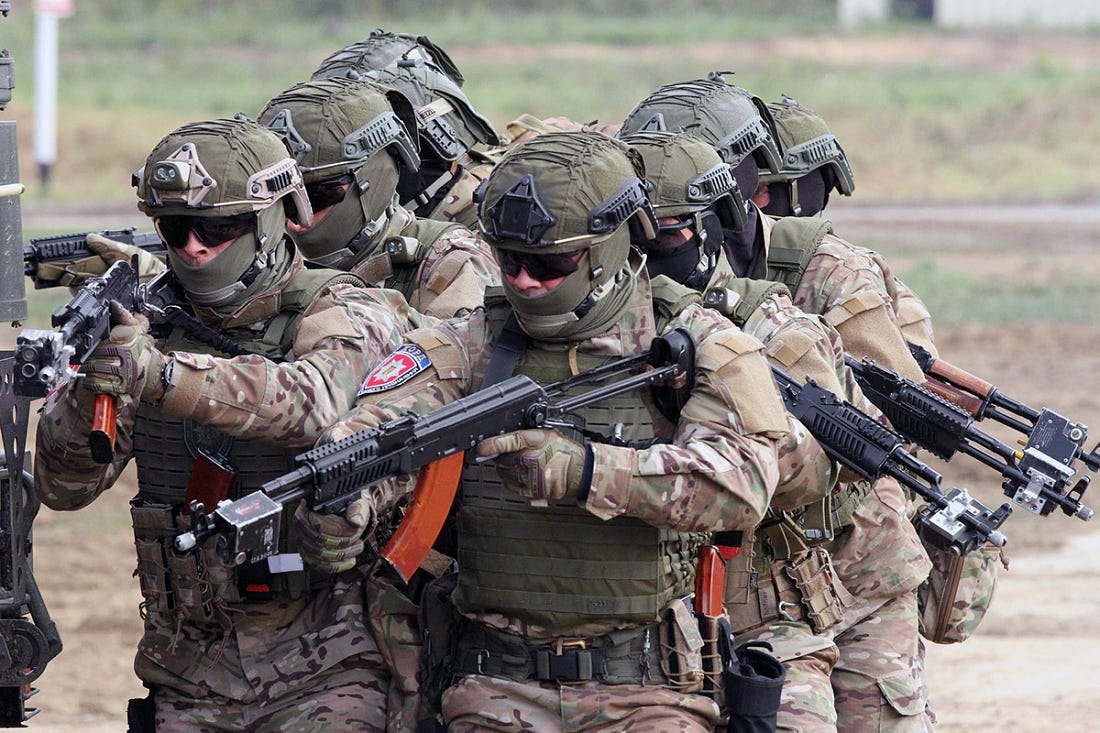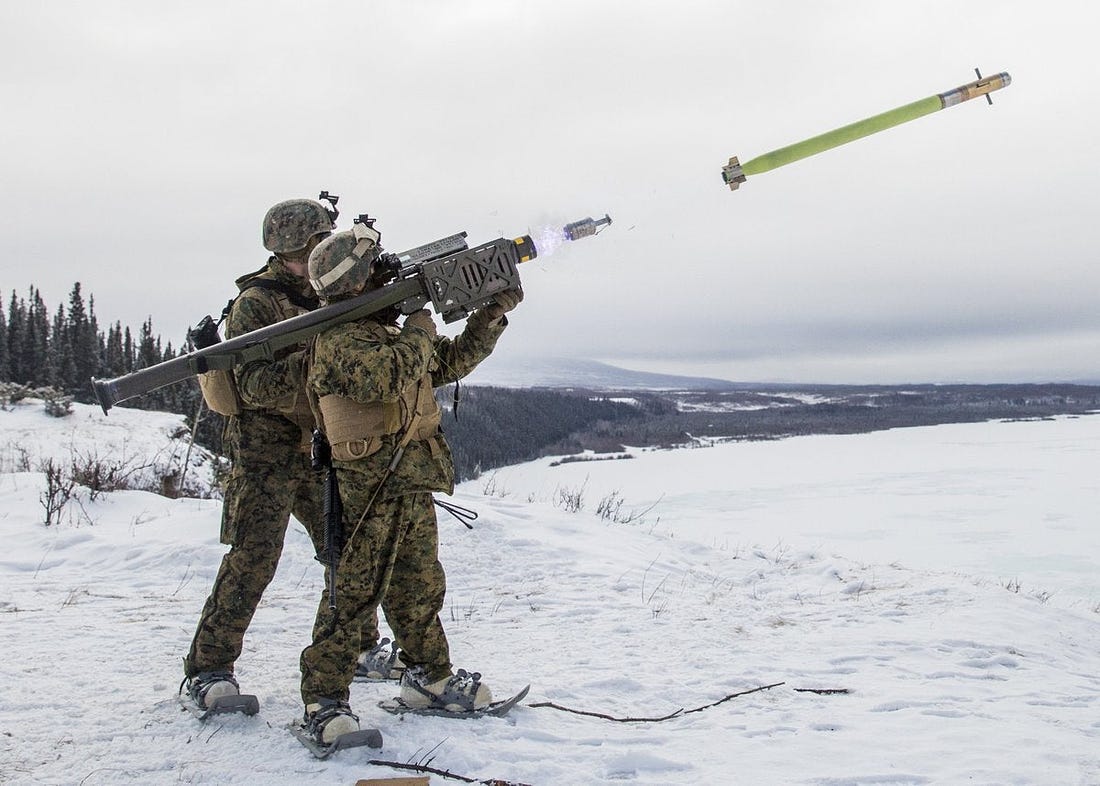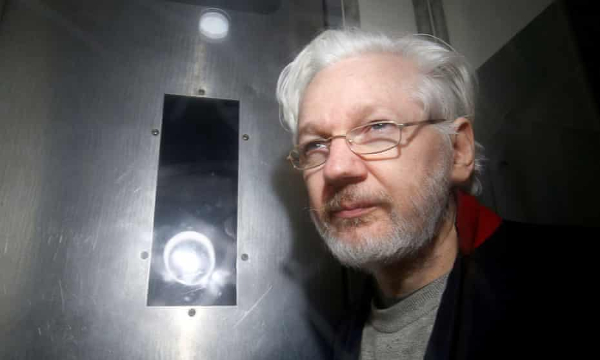US Signaling Putin that Ukraine Will Be Bloody
CIA, Green Berets prepare Ukraine for guerrilla war, while Washington eyes other Russian weak points
The diplomatic game of chicken between Russia and the U.S. appears to be rolling toward a violent climax, with a U.S. official warning Tuesday that the situation is "extremely dangerous," and that Russia could invade Ukraine "at any moment." The U.S.-Russia talks appear to be “at a dead end,” as one Kremlin diplomat put it last week, even as they intend to give it one more try on Friday in Vienna.
Washington has taken pains to appear girding Ukraine for battle, with CIA Director Bill Burns and Secretary of State Antony Blinken flying off to Kyiv for urgent meetings, all the while expediting intelligence support and defensive arms shipments. On Tuesday a bipartisan group of U.S. Senators visiting Kyiv vowed solidarity and weapons for the Ukrainian government and people, including possibly deadly Stinger anti-aircraft missiles. The CIA and U.S. Green Berets have been preparing Ukraine troops for unconventional warfare—a defense-only move, they say. But the training, which has included “tactical stuff,” is “going to start looking pretty offensive if Russians invade Ukraine,” a former senior intelligence official told Yahoo News’ Zach Dorfman.

"I think Vladimir Putin has made the biggest mistake of his career in underestimating how courageously the people of Ukraine will fight him if he invades," Senator Richard Blumenthal told reporters.
No one imagines that Ukraine can imperil, much less rout, a Russian invasion, but Washington’s part in the darkening drama has been to warn Putin that an attempt at a permanent occupation will be plagued by a bloody, U.S.-backed insurgency that will make its experience in Afghanistan seem mild in comparison.
And Washington could well be tempted to stir up trouble elsewhere.
“U.S. Special Forces Are Training for Full-Blown War with Russia,” a headline in The National Interest, a bipartisan conservative magazine, trumpeted last May. Green Berets and other American spec ops teams have been conducting joint training exercises in a Russia-ringing arc from northern Scandinavia through the Baltics to the Balkans and beyond, involving nearly two dozen foreign counterparts (Austria, Bulgaria, Croatia, Georgia, Germany, Hungary, Slovakia, Slovenia, Bulgaria, Montenegro, North Macedonia, Romania, Spain and, of course, Ukraine). Albania was just added to the mix. U.S. Special Forces have also been welcomed in some of the former Soviet republics of Central Asia.
“If Putin invades Ukraine with a major military force, U.S. and NATO military assistance—intelligence, cyber, anti-armor and anti-air weapons, offensive naval missiles—would ratchet up significantly,” James Stavridis, a retired four-star Navy admiral who was the supreme allied commander at NATO, told the New York Times last week. “And if it turned into a Ukrainian insurgency, Putin should realize that after fighting insurgencies ourselves for two decades, we know how to arm, train and energize them.”
Stavridis may have misspoken. “Fighting insurgencies,” we haven’t been so good at, from Vietnam to Iraq and Afghanistan, where U.S. efforts were undermine by their tethers to corrupt, inefficient regimes and officials. Supporting insurgencies, we’ve been better at.
But CNN reports that some Biden officials, “wary of getting bogged down in an anti-occupation support effort,” are not so gung-ho to green light an unconventional warfare campaign that could go on for years. Afghanistan is a not distant memory, it’s not even over.

"We can exact some pain, but there is a big difference between exacting pain and actually having leverage," a senior US official said.
Optimists look back to the U.S.-backed Muslim uprising against the Soviet Red Army during the 1980s, especially after the CIA deployed game-changing Stingers, which neutralized Russian warplanes and gunships. But other CIA-backed insurgencies—Nicaragua in the 1980s, Iraq in the 1990s and Syria over the past decade—have fallen far short of that mark. With one major exception—covertly backing Poland’s Solidarity movement in the 1980s—the CIA’s Cold War record of clandestine operations aimed at the Soviet Union and its Eastern European satellites was mostly a bust.
History Lessons
In the summer of 1948, President Harry S Truman’s White House National Security Council drew up “perhaps one of the most important documents in the CIA's history,” as a an agency planning document described it. NCS Directive 10/2 was a plan for all-out "covert operations" and “activities” against the Soviet Union and its Eastern European satellites.
Frank Wisner, the leader of Its psychological warfare component, thought the U.S. could exploit Russia’s “internal strains” and "psychological fission" to crack the Soviet Union. The project had some psywar successes, publicizing Soviet repression and economic failures, mainly through such CIA-backed propaganda vehicles as Radio Free Europe. But its efforts to subvert the USSR and its satellites by supporting or inventing anti-communist organizations in Russia were a spectacular bust. The KGB was always one step ahead.
“There were hundreds of these operations. And, yes, they ranged all the way from Bulgaria in the southeast of Europe all the way up to Poland, even in the Baltic states that were under Soviet control—or were part of the Soviet Union,” Scott Anderson, author of The Quiet Americans, told NPR in 2020. “They were uniformly disastrous. Virtually everybody who was parachuted in either disappeared or were captured and executed.”
In the 1960s, the CIA was busy at war elsewhere with the Soviets or their putative proxies, in Southeast Asia, Latin America and Africa. Covert action aimed directly at Mother Russia was pretty much abandoned over the next two decades.
Ronald Reagan would reverse that.
On May 20, 1982, Reagan signed into law National Security Decision Directive 32, authorizing diplomatic, propaganda, political, and military action to “contain and reverse the expansion of Soviet control and military presence through the world,” as Seth Jones, vice president of the Center for Strategic and International Studies put it in a 2018 paper. Reagan followed up months later with an even more aggressive Top Secret directive, one which declared “it was U.S. policy to unhinge Moscow’s grip on Eastern Europe and to reunite it—eventually—with Western Europe.” Its most lauded success, code-named QRHelpful, funneled $20 million worth of covert support to the Solidarity labor movement. Before the end of the decade, Eastern Europe cracked open, the Berlin Wall came down, and the Soviet Union, long sagging under its own economic weight and military adventurism, was well on the way to dissolution.
Tremors in Kazakhstan
It’s easy to understand why Vladimir Putin might’ve been rattled by the popular protests that swept across Kazakhstan early this month. His hands were already full with the crisis he’d manufactured in Ukraine. He blamed foreign interests, and people “apparently trained in terrorist camps abroad” for the unrest, which reportedly included well organized attacks on police stations.
Analysts awarded Putin a victory for his quick military intervention (officially, an action by Moscow’s version of NATO, the Collective Security Treaty Organization). But now he’s saddled with propping up yet another deeply unpopular and corrupt regime—which makes Kazakhstan a tempting target for the CIA and other Western intelligence agencies, especially should Putin go ahead and invade Ukraine. He appears deeply concerned that Kazakhstan, even Belarus, could be ripe for another wave of Western backed “color revolutions,” which shattered Moscow’s control of Eastern Europe beginning 20 years ago.
“Of course, there is definitely polarity in Kazakhstan between the rich and very poor, which has never been seriously challenged before now, and that is an important upshot from these protests,” says Michael Frachetti, a professor of anthropology at Washington University, St. Louis, who specializes in Central Europe.
“The future of Kazakhstan will be ultimately be decided by approaches the government takes going forward—whether they want to bolster a representative relationship with the populace or double down on the path toward greater autocracy,” Frachetti said.
“I suspect Putin is finding out that they don’t make spheres of influence like they used to, and that in this populist era he may be sitting over powder kegs more than client states,” Robert Manning, a former State Department official at the Atlantic Council, wrote earlier this month.
That’s a message Washington wants Moscow to hear in the Kabuki shadow war over Ukraine. And it’s understood that some in Washington are indeed serious about setting fires in Kazakhstan and elsewhere—not just Ukraine—should Russian troops and tanks cross the Dnieper in the coming days.
But the theater of veiled and unveiled threats is coming to a close. The real thing starts soon.

